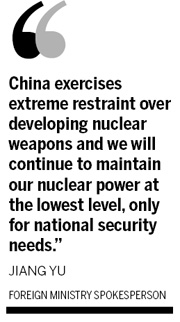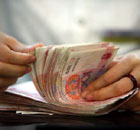Asia-Pacific
Nuke strategy's aim to protect national security, China says
By CHENG GUANGJIN (China Daily)
Updated: 2010-05-05 07:47
 |
Large Medium Small |
Beijing - China on Tuesday reiterated that its nuclear weapons strategy was only intended to safeguard national security and vowed to maintain its current nuclear arsenal at the lowest possible level.

"China exercises extreme restraint over developing nuclear weapons and we will continue to maintain our nuclear power at the lowest level, only for national security needs," Foreign Ministry spokesperson Jiang Yu told reporters.
"We are willing to make joint efforts with relevant countries towards nuclear disarmament and a nuclear-weapons-free world," Jiang added.
The comments come in the backdrop of a Nuclear Non-Proliferation Treaty (NPT) Review Conference, which opened in New York on Monday, and is expected to run until May 28.
Li Baodong, the Chinese permanent representative to the United Nations, leads the national delegation at the conference and is scheduled to make a speech in the afternoon local time.
Beijing has consistently maintained that it would never be the first to use nuclear weapons at any time and under any circumstances.
"It is China's bottom line in diplomacy to safeguard the dignity of the NPT and its principles," said Yin Gang, an expert at the Chinese Academy of Social Sciences.
| ||||
"As a responsible country in the world, China seeks nuclear security and firmly opposes nuclear proliferation and nuclear terrorism," Hu said at the summit.
"But it is impractical and unequal for China to make public the number of nuclear weapons or (go in for) nuclear disarmament," as what the US did and requires China do the same, said Zhai Dequan, deputy secretary-general of the China Arms Control and Disarmament Association.
Zhai said the disclosure by the US of its nuclear weapons arsenal shows its frankness in nuclear disarmament, but at the same time, "it also shows its devastating nuclear power and nuclear deterrence in this way."
Whether China will emulate the US-Russia nuclear arms control treaty depends on the international nuclear security reality. "US and Russia possess about 90 percent of the total nuclear weapons in the world, with China and other countries (having) less than 10 percent," Zhai said.
On April 8, US president Barack Obama and Russian President Dmitry Medvedev signed in Prague the US-Russia New START treaty, vowing a maximum of 1,550 deployed warheads, about 30 percent lower than a limit set in 2002.
Zhai said the NPT review conference should aim for a consensus on under what conditions nuclear weapons can be used and reduce double standards on peaceful use of nuclear power.
The 2010 Nuclear Posture Review released by the US in April ruled out a nuclear attack against non-nuclear-weapons states who are signatories to the NPT. However, it leaves open the nuclear attack option against Iran and the Democratic People's Republic of Korea.









